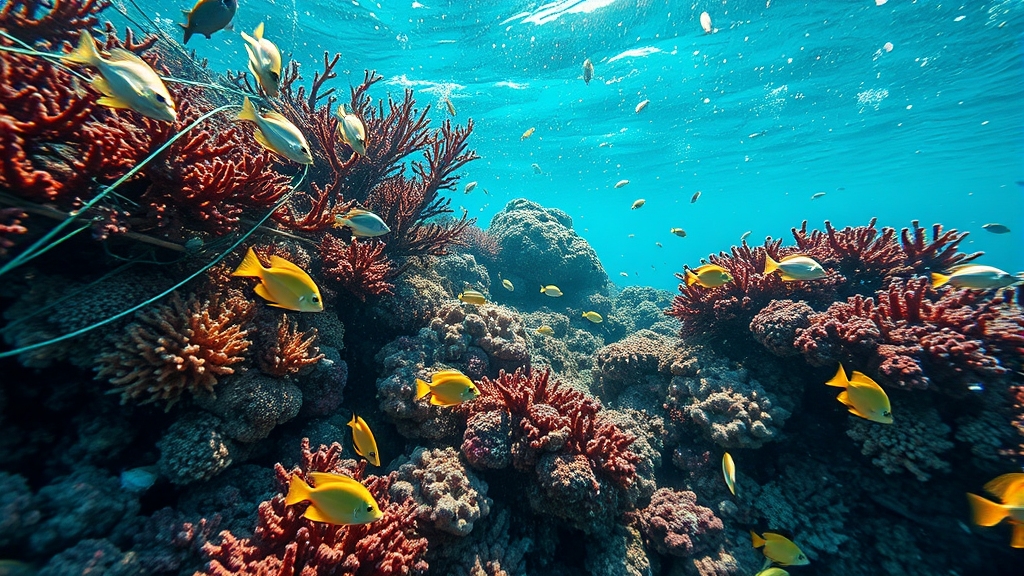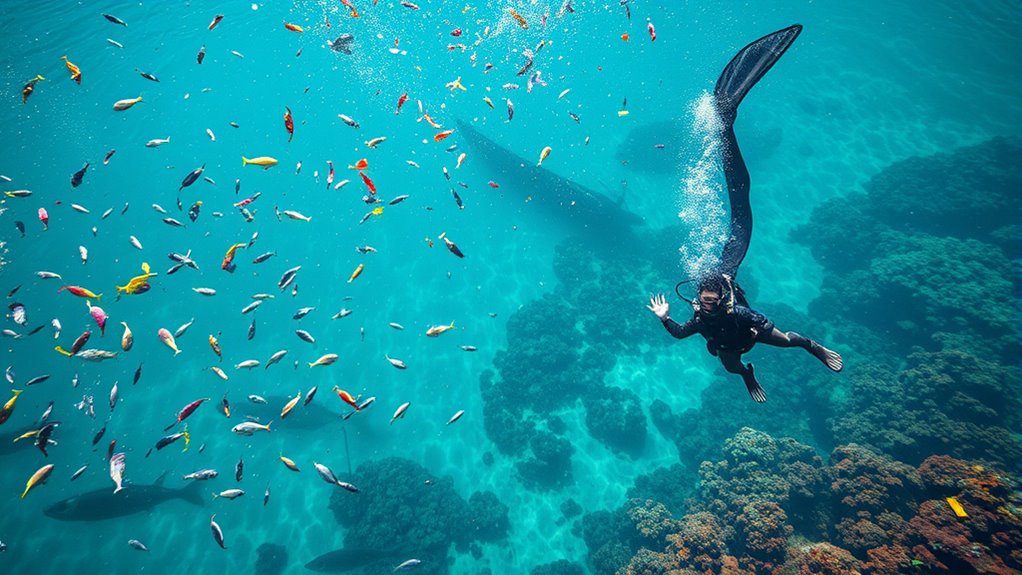To help protect oceans from overfishing and plastic pollution, you can support Marine Protected Areas and choose sustainable seafood options. Reducing plastic waste by using reusable products and participating in cleanup efforts also makes a difference. Advocating for stronger policies and making eco-friendly choices can promote healthier marine ecosystems. If you’re interested, there’s more to discover about how your actions can contribute to ocean conservation and guarantee thriving oceans for future generations.
Key Takeaways
- Establish Marine Protected Areas to conserve biodiversity and allow fish populations to recover.
- Promote sustainable fishing practices like setting catch limits and seasonal closures.
- Reduce plastic waste through reusable products and support cleanup initiatives.
- Support policies that enforce sustainable fishing and pollution reduction measures.
- Foster international cooperation to protect migratory species and preserve ocean ecosystems.

Have you ever considered how essential our oceans are to life on Earth? They cover over 70% of the planet’s surface and are home to countless species, many of which are vital to the global ecosystem. Yet, these incredible environments face serious threats, especially from overfishing and plastic pollution. To protect these vital resources, many countries are establishing marine protected areas (MPAs) designed to conserve marine biodiversity and restore fish populations. These MPAs serve as safe havens where marine life can thrive without the pressures of commercial fishing. When you support or advocate for the creation of such protected zones, you’re helping to guarantee that fish stocks remain sustainable and ecosystems stay balanced. This is essential because overfishing not only depletes fish populations but also damages the complex food webs that sustain ocean health. By promoting sustainable fishing practices within and around MPAs, you contribute to a balanced approach that allows communities to meet their needs while preserving marine biodiversity for future generations. Additionally, understanding the importance of Red Lentils and other nutritious foods can encourage more sustainable diets that reduce pressure on overexploited fish stocks.
Sustainable fishing is more than just a buzzword; it’s a necessary shift in how we harvest ocean resources. It involves setting catch limits, using selective gear to reduce bycatch, and respecting seasonal closures to allow fish populations to recover. When you choose sustainably sourced seafood, you’re supporting fishing methods that minimize environmental impact. This reduces the risk of overfishing and helps maintain the natural balance of marine ecosystems. Proper management of fisheries is essential to prevent collapse of fish stocks and to protect the livelihoods of communities dependent on fishing. It’s also about fostering international cooperation, because many fish species migrate across borders, making conservation efforts a collective responsibility. By making conscious choices and advocating for policies that enforce sustainable fishing practices, you’re actively participating in the effort to conserve ocean life.
Plastic pollution, with its persistent and widespread presence, exacerbates these issues. Every piece of plastic that ends up in the ocean can be ingested by marine animals or cause entanglement, often leading to injury or death. Your role in reducing plastic waste is critical. Using reusable bags, bottles, and avoiding single-use plastics directly decreases the amount of debris entering the ocean. Supporting organizations that clean up beaches and waterways also makes a difference. The reduction of plastic pollution not only benefits marine animals but also improves the health of entire ecosystems and the human communities that rely on them. When you recognize the interconnectedness of these challenges—overfishing, plastic pollution, and habitat destruction—you become part of a broader movement committed to protecting our oceans. Your actions, no matter how small, contribute to the global effort to restore and preserve the ocean’s incredible biodiversity for generations to come.
Frequently Asked Questions
How Do Overfishing and Plastic Pollution Specifically Impact Marine Biodiversity?
Overfishing and plastic pollution threaten marine biodiversity by causing habitat destruction and increasing bycatch reduction challenges. You see, overfishing depletes fish populations and damages ecosystems, while plastic pollution harms marine life through ingestion and entanglement. These issues reduce species diversity and disrupt food chains. To protect marine biodiversity, you can support sustainable fishing practices and reduce plastic waste, helping preserve the ocean’s delicate balance for future generations.
What Are the Most Effective Community-Led Initiatives for Ocean Conservation?
Your community can be a powerful force for change, shaping ocean conservation efforts. You should promote community engagement through local clean-up events and sustainable fishing practices. Education programs are key—by raising awareness about overfishing and plastic pollution, you empower others to act. When everyone joins forces, your community’s impact can be monumental, ensuring healthier oceans for generations to come. Your actions can truly make waves!
How Can Consumers Reduce Their Plastic Footprint Related to Seafood Consumption?
To reduce your plastic footprint when seafood shopping, choose seafood with reputable certification to guarantee sustainable sources. Opt for products in biodegradable packaging to minimize plastic waste. Be mindful of your choices, and consider buying from local markets that prioritize eco-friendly practices. By making these conscious decisions, you help protect marine life and support sustainable fishing methods, ultimately contributing to healthier oceans.
What Role Do Governments Play in Enforcing Sustainable Fishing Practices?
Governments play a vital role by setting fishing quotas to prevent overfishing and guarantee fish populations stay sustainable. They also enforce marine laws through patrols and surveillance, helping to combat illegal, unreported, and unregulated fishing. By implementing these measures, you can trust that sustainable practices are upheld, protecting marine ecosystems for future generations. Your support for policies promoting marine enforcement and responsible quotas makes a real difference in ocean conservation.
Are There Innovative Technologies Helping to Remove Plastic From Oceans?
You’ll find that innovative technologies are making a difference in removing plastic from oceans. For example, artificial reefs help trap debris and support marine life, while biodegradable plastics break down naturally, reducing pollution. These advancements enable you to play a part in protecting marine ecosystems. By supporting such technologies, you contribute to cleaner oceans and a healthier environment for future generations.
Conclusion
Now that you understand the threats of overfishing and plastic pollution, the future of our oceans depends on your actions. Will you choose to ignore the signs and let these problems worsen, or will you step up and make a difference? The ocean’s health hangs in the balance, and every decision you make can tip the scales. The question is, are you ready to be part of the solution before it’s too late? The tide is turning—what’s your move?









